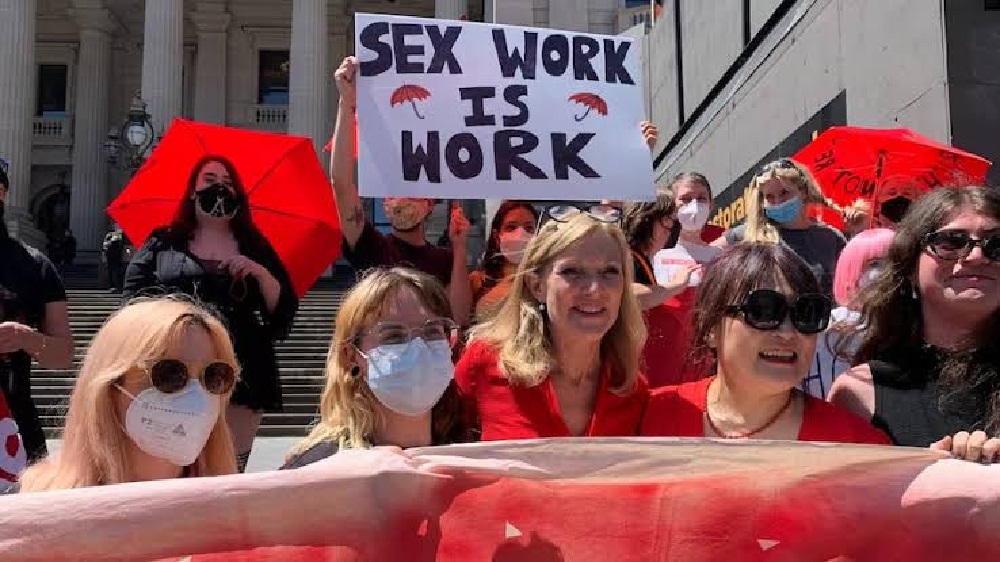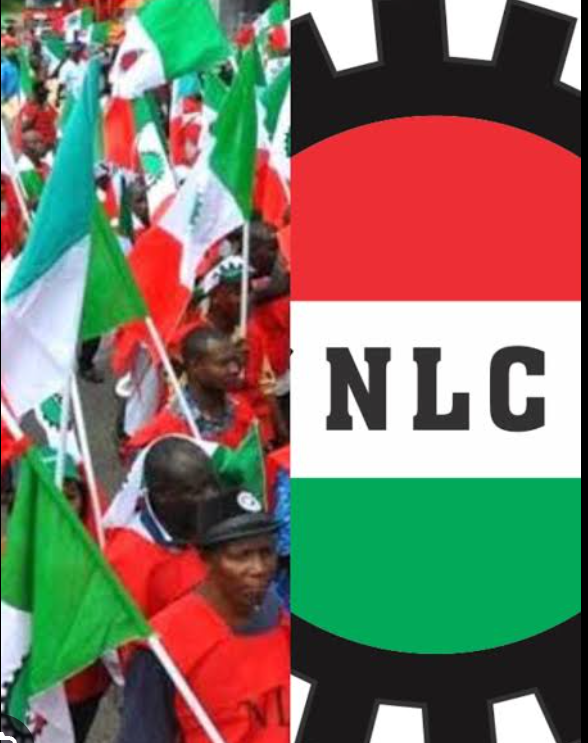News
Belgium Becomes First Country to Grant Full Labor Rights to S£x Workers

S£x workers in Belgium can now have job contracts that allows them to be entitled to health insurance, pensions, sick leave, and maternity leave.
Belgium is the first country in the world to pass a law to give labour rights to s£x workers.
The move follows the country’s 2022 decision to decriminalize s£x work.
Under the new regulations, s£x workers will have access to health insurance, paid leave, maternity benefits, unemployment support and pensions. The legislation also establishes rules on working hours, pay and safety measures, addressing a long-standing gap in legal protections for those in the industry.
“This is an incredible step forward,” said Isabelle Jaramillo, coordinator of Espace P, an advocacy group involved in drafting the legislation. “It means their profession can finally be recognized as legitimate by the Belgian state.”
“From the employer’s perspective, this will also be a revolution. They’ll have to apply for a state authorization to hire s£x workers,” Jaramillo said.
“Under the previous legislation, hiring someone for s£x work automatically made you a pimp, even if the arrangement was consensual,” said Jaramillo. “Now, They’ll have to apply for state authorization to hire employees.”
Employers must now obtain authorization, adhere to strict safety protocols, and meet background requirements, including no prior convictions for s£xual assault or human trafficking. They must provide clean linens, condoms, and hygiene products, and install emergency buttons in workspaces.
Independent s£x work remains permitted, but unregulated third-party hiring or violations of the legal framework will be prosecuted.
Critics argue the law cannot fully address the stigma and risks tied to the trade, especially for undocumented s£x workers.
“There’s still a lot of work to be done,” said Jaramillo, emphasizing the need for better police and judicial training to protect marginalized workers.
While countries such as Germany and the Netherlands have legalized s£x work, none have implemented labor protections as comprehensive as Belgium’s.
News
SAD! World’s oldest person passes away at 116

The world’s oldest person, a Brazilian nun named Inah Lucas, has died at the age of 116, barely months after assuming the global title.
Her death was confirmed on Wednesday by her religious order and longevity researchers.
Lucas passed away in Porto Alegre, Brazil, where the Congregation of Teresian Sisters expressed gratitude “for the dedication and devotion” she had shown throughout her life of service.
Born on June 8, 1908, Lucas had become the world’s oldest living person in January following the death of 116-year-old Japanese woman, Tomiko Itooka.
She became a nun in 1934, at the age of 26, during the years between the two World Wars.
Her remarkable life drew attention from longevity experts and religious communities alike.
In a tribute, LongeviQuest described her as a frail child at birth, “Many doubted she would survive.”
Despite those early odds, Canabarro lived for over a century, often attributing her long life to her faith.
“He is the secret of life. He is the secret of everything,” she once said, referring to God.
In 2018, on her 110th birthday, she received a papal blessing from Pope Francis, who himself passed away last Monday at age 88.
While Canabarro had personally claimed her birthdate as May 27, 1908, researchers say otherwise.
“Her documented birth date according to records is June 8, 1908,” Gerontological Research Group director Robert Young stated in January.
LongeviQuest noted that she ranks as the 15th-oldest documented person in human history and the second-oldest nun ever recorded, after Lucile Randon of France, who lived to 118 and died in 2023.
With her passing, the title of world’s oldest living person now goes to Ethel Caterham, a 115-year-old resident of Surrey, England, according to the US-based GRG and the LongeviQuest database.
News
Workers’ suffering: NLC laments on May Day, seeks immediate relief

President of the Nigeria Labour Congress (NLC), Comrade Joe Ajaero, has alleged that workers in the country, including ordinary citizens, are facing a harrowing situation in which the civic space is being gagged and compressed to the extent that people can no longer express themselves freely without security measures being used to curtail them.
He made this known at the 2025 Pre-May Day Lecture, themed “Reclaiming the Civic Space in the Midst of Economic Hardship,” held at the headquarters of the NLC on Wednesday.
“The civic space is being compressed. Even last two weeks or last week, the people came out to protest police stopped them in Port Harcourt and other places. These days, protests are being fought, people are not allowing Nigerians to freely protest.
“Even that of minimum wage and hardship we tried and they tried to stop us. Forces are being used to compress the civic space and if you do that, you match the end to democracy even those sponsoring it will be the potential victims of it.
“I can tell you, all the people there now are beneficiaries of the suffering of some of us, who protested the military stay in office, annulment of June 12 and all that. None of them was known, their names are not even known in their community. If the civic space was closed, none of them will be in National Assembly, none will be a governor today.
“I think they’re having a momentary relief, it’s not going to last. It is the duty of the civil society, the labour movement to make sure that we’ll fight for the civic space to open.”
Ajaero, who noted that student protests have been suppressed and many voices sponsored to work against popular views, said the labour movement in Nigeria would continue to speak truth to power and fight for the rights of Nigerians.
Corroborating Ajaero’s position, the guest lecturer and Professor of International Law, Sir Christopher Chukwuma, stressed the need to review laws and policies—particularly the Cybercrime Act and the Public Order Act—that are restricting and criminalising civic engagement in the country.
Chukwuma expressed concern that the civic space in Nigeria was diminishing, noting that workers and unions no longer had the freedom to express themselves in a country that claims to practise democracy.
He emphasised that a vibrant civic space is essential to the proper functioning of democratic processes.
According to him, democracy in Nigeria is being threatened by corruption, lack of accountability, threats to the lives of civic actors, and the imposition of domestic laws on what he described as “the civic society of decision.”
He said, “We know how they happen in this country. The very moment there is increase in vulnerability and marginalization of certain groups of people, the civic space is dying. There is a problem.”
Chukwuma added that restrictions on peaceful protests, the mobilisation of security forces to threaten those who wish to exercise their rights, control of social media, attacks on media organisations and practitioners, limited access to justice, inadequate protection of human rights defenders, and insults were all threats to the civic space in Nigeria.
He insisted that although economic hardship could suppress the civic space or distract civic actors by shifting their attention to survival, Nigerian workers still have an opportunity to reclaim and revitalise that space.
He said, “There is need for a focus for policy reforms, there should be a need for certain restrictive laws to be amended. The NLC can advocate for changes in certain laws that potentially criminalize civic engagement, such as the Cybercrime Act and the Public Order Act, the NLC can do that.
The NLC can advocate for reforms that prevent excessive force against civic actors and increase transparency and oversight of security agencies, especially towards human rights defenders or activists.
“There is a need to strengthen the workers’ rights and civic empowerment by reviewing and revisiting laws and regulations that make civic space, ensuring they align with international human rights to their standards. This includes revisiting restrictive legislation, such as the Companies and Allied Matters Act, to protect thoughts of civil society organizations and felicitate their operations. The Congress can do that.
“There is need for implementation measures to enhance citizens’ participation in decision-making processes. These can be achieved through the mechanisms such as town hall meetings. It has always been going on, but encouraging to move on. The Media Rights Agenda is still another aspect of civil society organizations. But there can be collaborations where one finds it difficult, the other helps.”
“The need to resuscitate or reclaim the civic space in order to sustain democracy in Nigeria focuses on the experiences we have had from the past administrations, and it highlights the urgent need for safeguarding freedom of expression, strengthening civil society engagement, enhancing transparency and accountability, especially from the leaders, in order to foster dialogue and reconciliation.
“These measures are crucial for nurturing a vibrant democratic environment that will uphold citizen rights, promote inclusivity, and foster the long-term sustainability of democracy in Nigeria.”
News
Nigerian Banks’ Customers To Pay N6 Per SMS Transaction Alert From Today

Bank customers in Nigeria will begin paying N6 for each SMS transaction alert starting Thursday, May 1, 2025, following an upward adjustment in telecommunications service rates recently approved by the federal government.
The new fee represents a 50 percent increase from the previous N4 charge per message and has been communicated by several commercial banks to their customers ahead of the implementation.
Guaranty Trust Bank Limited was among those that issued notices. In an email to customers titled “Increase in SMS Transaction Alert Fee,” the bank explained that the revision was necessitated by higher charges from telecommunications providers. “Dear Valued Customer, Please be informed that effective Thursday, May 1, 2025, the SMS transaction alert fee will increase from N4 to N6 per message. This adjustment is due to a recent increase in telecom rates as communicated by the telecommunication service providers,” the notice read.
The bank emphasized the importance of SMS alerts, stating they are essential tools for customers to monitor and maintain control over their account activities. It also noted that SMS alerts sent to international phone numbers would incur additional charges.
The increase in telecom rates and corresponding adjustment in SMS alert fees come amid broader concerns over rising costs of living and digital access in the country.
-

 News20 hours ago
News20 hours agoA Chat with Janet Odio Okolo: A Mother’s Journey Raising a Child with Down Syndrome
-

 News23 hours ago
News23 hours agoHon. Dennis Agbo Resigns From Labour Party
-

 News23 hours ago
News23 hours agoJust in: Osun PDP receives defectors from APC, others
-

 News24 hours ago
News24 hours agoIGP Egbetokun orders his men to resume issuance of tinted glass permits
-

 News11 hours ago
News11 hours agoJust In: Explosion rocks Borno military barracks
-

 Entertainment12 hours ago
Entertainment12 hours agoWhy Portable was sentenced to three months in prison
-

 News21 hours ago
News21 hours agoHon. Nnamchi Begins Street Lights Deployment In Isi Uzo(Photos)
-

 News11 hours ago
News11 hours agoCBEX restarts operations despite SEC ban, N1.2tn EFCC investigation
















